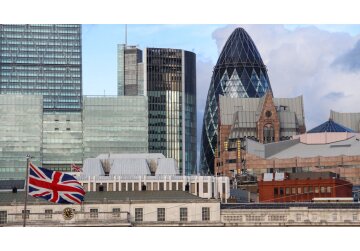
The UK actually fared much better after COVID than first thought - here's why it matters
The Office for National Statistics has made some pretty dramatic upward revisions for 2020 and 2021 - and negativity among investors, households and businesses about lacklustre UK growth may have been misguided.
Comparing the UK economy with its pre-pandemic size has become an almost totemic way of highlighting its sluggish performance post-COVID.
It has certainly been a gift for Opposition politicians and in particular when - in September last year - the Office for National Statistics (ONS) produced evidence that the UK was the only economy in the G7 group that remained smaller than it was in February 2020.
However, today brought news that the UK economy actually fared better in the post-COVID period than previously thought.
The ONS unveiled a series of revisions for past GDP growth - affecting both 2020 and 2021.
It said that the UK economy contracted by 10.4% in the main pandemic year of 2020 - less worse than the 11% contraction previously reported.
And it said UK GDP grew by 8.7% in 2021 - considerably better than the previously reported growth of 7.6%.
Put together, it means that at the end of 2021 - rather than being 1.2% smaller than it was going into the pandemic as previously reported - the UK economy was actually 0.6% bigger.
Some will say that this is all just rear-view mirror stuff and does not really matter.
But it does.
UK recovery was well ahead of Germany
Even in its most recent estimates for quarterly growth, the ONS was suggesting that, during the three months to the end of June, the UK economy remained 0.2% smaller than it was during the final three months of 2019, the last full quarter before the pandemic struck.
Carry these revisions across to the latest data though, and it means that, rather than being at the bottom of the G7, the UK's economic recovery post-pandemic was well ahead of Germany and not far behind those achieved by France and Italy.
The Treasury was also quick to point out that, as of the end of 2021, the UK's recovery trailed only those of the US and Canada in the G7.
Chancellor Jeremy Hunt said: "The fact that the UK recovered from the pandemic much faster than thought shows that once again those determined to talk down the British economy have been proved wrong.
"There are many battles still to win, most of all against inflation so we can ease cost of living pressures on families. But if we stick to the plan we can look forward to healthy growth which according to the IMF will be faster than Germany, France, and Italy in the long term."
The ONS explained the rather dramatic upward revision thus: "These revisions are mainly because we have richer data from our annual surveys and administrative data, we are now able to measure costs incurred by businesses [intermediate consumption] directly and we can adjust for prices [deflation] at a far more detailed level."
Why are the revised figures different?
Part of the revision can be explained by the fact that the ONS now has a more detailed understanding of how much people were being paid in the 2021-22 financial year following the availability of more up-to-date information from HM Revenue & Customs. More up-to-date information on household spending during 2021, for example on telecoms services, has also been incorporated into the assessment of GDP.
Put together, these led to some pretty dramatic upgrades in parts of the services sector, which makes up four-fifths of UK GDP. The ONS now thinks the services sector as a whole grew by 10.9% in 2021, way ahead of the previous estimate of 7%, which is a pretty extraordinary upward revision.
The biggest contributors to that, according to the ONS, was from the wholesale and retail trade, and repairs to cars and motorcycles in particular.
Another contributor was accommodation and food services, which is now reckoned to have grown by 31.3% in 2021, up from the previous estimate of 30.9%.
Clearly the rush among Britons to eat out and stay in hotels after lockdowns ended was even bigger than previously thought.
Other sectors where activity was stronger than previously assumed were professional scientific and technical activities and healthcare services.
The commercial property sector, previously thought to have contracted during the year in question, is also now reckoned to have enjoyed growth.
news.sky.com







